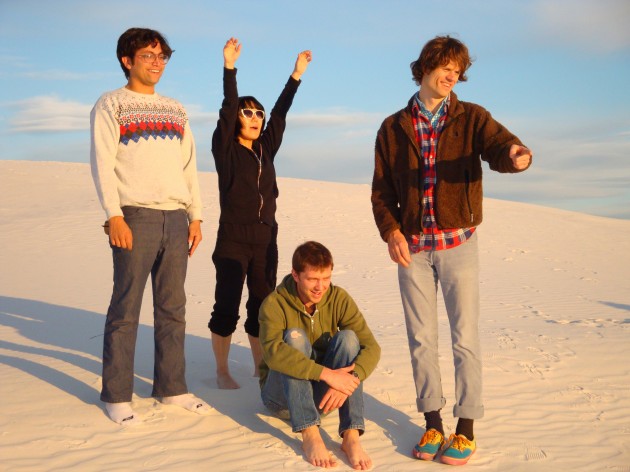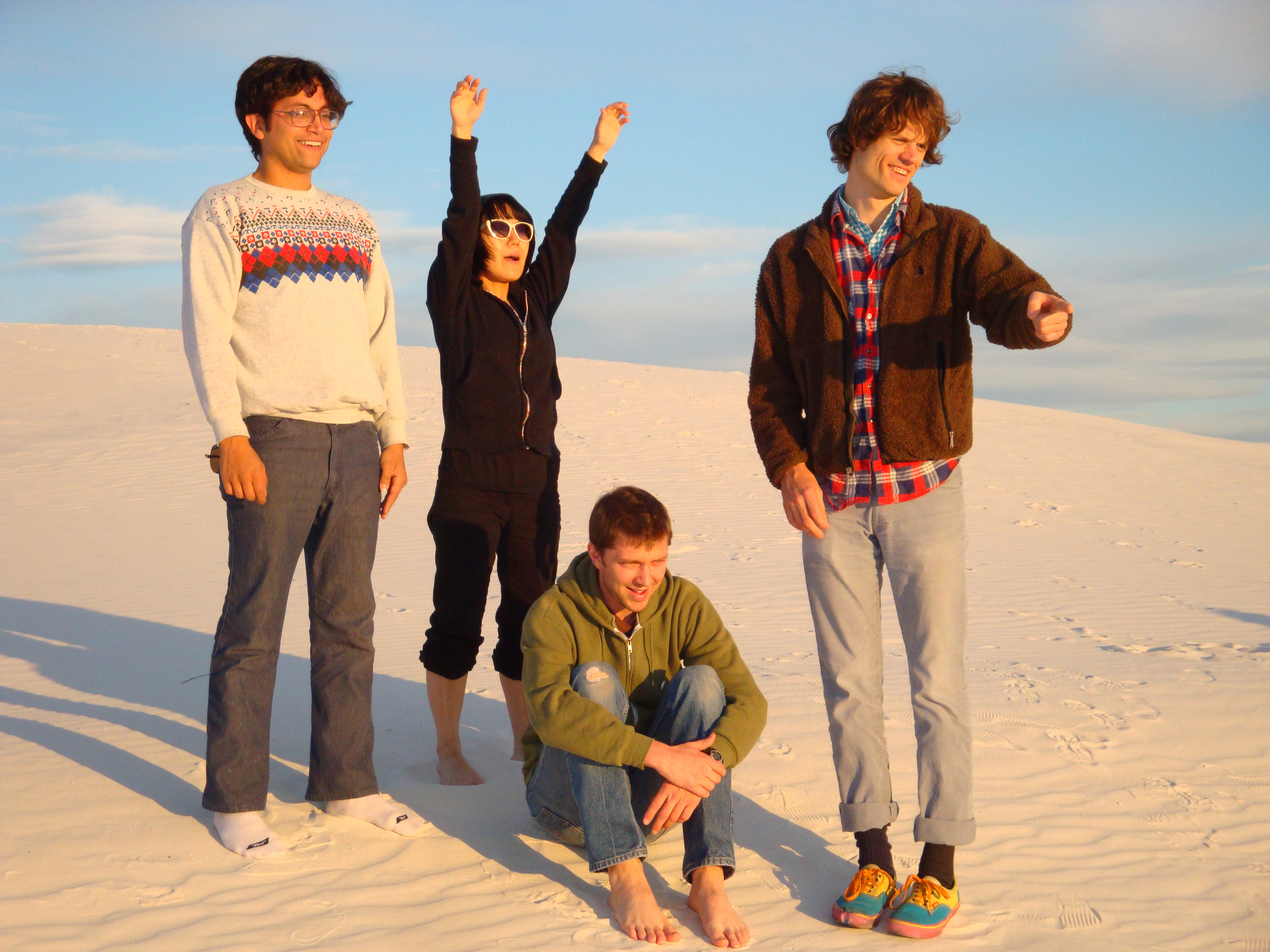
Deerhoof seem to deal with things just a little bit differently than your average band. Their new album Breakup Song is ostensibly about the heartache and pain that comes from pulling yourself through multiple emotional scrapes but the songs sound as upbeat and playful as anything off their mischievous 2011 album Deerhoof Vs. Evil. The lyrics, such as they are, are all about the band turning this heartache in on itself and using fragmented thoughts and sometime incoherent emotional reasoning to blunt the harsh reality. Like most of us, the band does whatever it can to get by. They just seem to come at it in a more tangential way than the rest of us.
But this refusal to conform to expectations is also the band’s most endearing quality. They never seem to approach an album the way you might imagine. Even their albums which are generally considered to be more accessible like The Runners Four and Apple O veer off into surprising and unanticipated musical spaces. This expected eccentricity is what keeps fans eager to get their hands on as much new material from the band as possible. And with a discography that has them releasing an album almost every year for the past 15 years, fans don’t have much to complain about.
Lead guitarist Ed Rodriguez was nice enough to sit down and answer a few questions for Beats Per Minute concerning the development of Breakup Song, the often confusing identities within the band, and how using a good medicated shampoo is important to a having a good strut.
Beats Per Minute (Joshua Pickard): Your last record, Deerhoof Vs. Evil, was released very early in 2011. Your new album Breakup Song is set to come out at the beginning of next month. For a lot of bands this quick turnaround is seen as somewhat atypical, but Deerhoof have never really followed the prescribed course for most bands, either in terms of release schedules or creative expectation. You’ve released 12 records, including your new one, in the last 15 years, with most, if not all of them, showing up on many critics best-of lists. How have you and the band been able to keep up with this kind of consistent stream of new material?
Ed Rodriguez: For years we depended on our individual work ethic and love of what we’re doing but now that we offer a college credit we have enough interns churning out hits to kick back a bit. Recently I’ve been building a boat and I’m finally caught up on Game of Thrones.
BPM: You’ve had a lot of record time to play around with different types of music. In the initial release from the band concerning the new album, the songs were described by Greg Saunier as “Cuban-flavored party-noise-energy music.” Your albums have always had a chaotically purposeful feel to them, to me at least. When you began to pull together the initial ideas that would become Breakup Song, were you and the rest of the band pretty much in agreement concerning how you all felt that the album should develop?
ER: We initially agreed on a set of descriptive words, as we each began to work on what we thought those words meant we found out that none of us really understands english very well. After that failed we begun to chisel away at the music we started writing to get back to what those words meant to each of us. That’s part of what may seem chaotic to some people, a group of people trying to become one inside of your head at once. Of course that sounds like a party to some and a drunken street brawl to others.
BPM: It’s immediately obvious listening to Breakup Song that there is a wide range of influences bouncing around on these songs. But contrary to what someone might assume given this fact, these songs definitely have an organic feel to them. They don’t feel thematically piecemeal. But with so many influences making their way onto the album, was there ever a case of something that you really wanted to incorporate that just didn’t work or that never quite came together the way the band felt that it should?
ER: Of course no music can contain everything you’ve every wanted. If that was possible you’d write one ultimate song and never feel the need to write another. Actually, that’s a great idea. All other bands should enjoy this upcoming year because if we pull this off our next record will be the last one ever written by anyone.
BPM: For most bands, it’s fairly easy to spot their influences. But with Deerhoof, the influences are so much a part of what makes each album unique that it becomes difficult to pinpoint specific examples. It feels like you’re pulling from entire genres instead of particular artists. For example, I hear a heavy South American influence on Breakup Song and I don’t think comparisons to artists like Os Mutantes or Gal Costa would be too far off the mark. What were some of the more influential non-rock artists that you and the band brought to the table in regards to the composition of Breakup Song?
ER: No one in the band really listens to much of the same music or thinks about bands quite the same. Most of coming to a meeting spot on material came from recording demos and showing them to each other and discussing what was good and bad about them. When we try and convey ideas by bringing up other bands what usually happens is we discuss Motley Crue, Greg sees their defining trait as their rhythm, Satomi writes songs about the Sunset Strip, John thinks the band is all about the power chords and I show up to practice coked up out of my mind with my pants on fire.
BPM: After having spent some time with Breakup Song, Greg’s initial description of the record is quite apt. For me, tracks like “The Trouble With Candyhands” and “There’s That Grin” display a more self-assured side to the band, that becomes all the more evident when you see how well the band piles on layers and layers of instrumentation on top of the vocals and you see that nothing on the track seems superfluous. When you were in the studio recording this album, did you ever feel that these particular songs felt any different than songs on previous records? Or was it just a case of business as usual in the studio?
ER: We’re more influenced by what we’ve already done than anything. In that case it’s business as usual, trying to get better and stay happy in what we’re doing. After each year of touring we can see what we like about the last group of songs and what we’d like to do more of, also what wasn’t there we’d like to add. The clearer those feelings are the stronger we can make our next step. Plus I got a new medicated dandruff shampoo that gave me my strut back.
BPM: Along those same lines, would you walk us through a typical recording session for the album? As I was listening to the record, I was imagining every conceivable studio setup that might produce the sounds I was hearing but I would love to hear what actually took place and how things were set up there in the studio.
ER: Virtually all of the recording set up for this album looked identical. Someone hunched over a computer at home. Almost everything was recorded directly into a laptop, occasionally even through it’s own microphone. We all use whatever means we have at the moment to do what we’re thinking of. The piano parts were added when there happened to be a piano at one of the venues we played at. The drums are almost entirely electronic because Greg had to record them in his apartment. For us it’s about making the most of what we have, learning to use our limited resources to the best of our abilities. It’s more time consuming but it adds up. Each record we discover something that would have made doing the last one much easier.
BPM: Are there set dynamics within the band? By that I mean to ask if there are set roles that each member plays? Does Greg bring in a specific dynamism and musical direction as opposed to Satomi or John or Ed?
ER: Everyone has their own thing and when we all get on the same page that becomes Deerhoof. Nothing is set. Sometimes I’m Satomi and Greg is me. Sometimes Satomi is both Greg and me and we’re both her. But no one is ever John. He’s too much of a mess.
BPM: And talking about everyone’s roles in the band, what is the process for bringing an idea for a song or possibly a concept for an album in front of the band for discussion?
ER: It’s pretty simple. Everyone brings in whatever they’re thinking whenever they like. It never stops. Ideas for a record direction. What you like/dislike about how the music is going. Anything. You just fill out Form 23a, wait for initial approval for pre-review. Once that’s accepted a quick summary of the intended conversation on Form IC and wait for the confirmed date that your idea will be heard. I joined the band last so most of the things I’ve been wanting to say are scheduled for late 2013.
BPM: Deerhoof are known for their extensive and exhaustive tour schedules. In fact, just a day after Breakup Song is released, you’re heading out on another tour beginning in Washington, DC. How difficult is it to maintain this kind of touring habit when you’ve got band members who all contribute to other bands and who all lead separate lives? It seems to me that as each year goes by, it would become more difficult to pull together everything that needs to be prepared to organize a full scale tour. Do you ever find that that is the case?
ER: Thankfully we’re all great friends and absolutely delightful people to be around so it’s fun to be together. We’re also considerate of what everyone has going on when we make our schedule. The logistic part gets easier if you learn from your mistakes. We’ve learned and are now the smartest band in the world from everything we’ve screwed up over the years. It’s also extra essential for us to be organized since we’re our own management. Dividing up duties is key. I book hotels, Satomi books flights, John rents cars, Greg discusses sound and lighting, that kind of thing for all our countless tasks. I make sure our 18th century rugs are delivered before we arrive and John throws all the TVs from our hotel rooms into the pool. Organized.
BPM: And just one more question. It’s one that I’ve wanted to ask since I first heard the album. I’ve talked quite a bit about the bands’ influences figuring prominently into the makeup of the new album. Would you care to give us a hint of what the band has been listening to lately and even before the initial tinkering with the songs that would eventually become Breakup Song?
ER: I can’t really speak for anyone else in the band but I’ve been listening to my friends voices, movies and my dog making weird noises while he sleeps.
Breakup Song comes out on September 4th from Polyvinyl Records. Read our review here.

